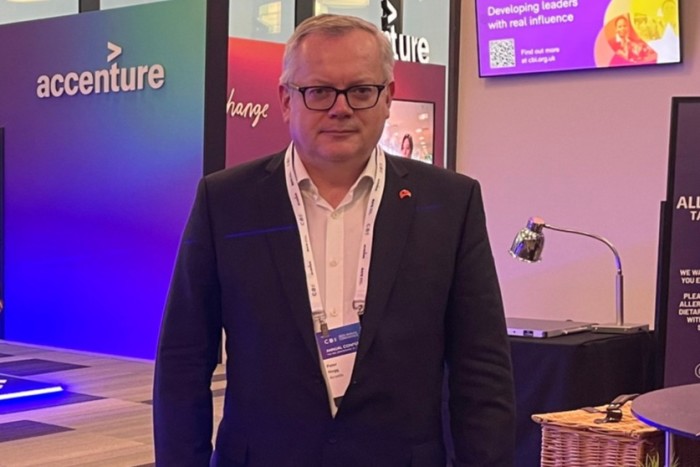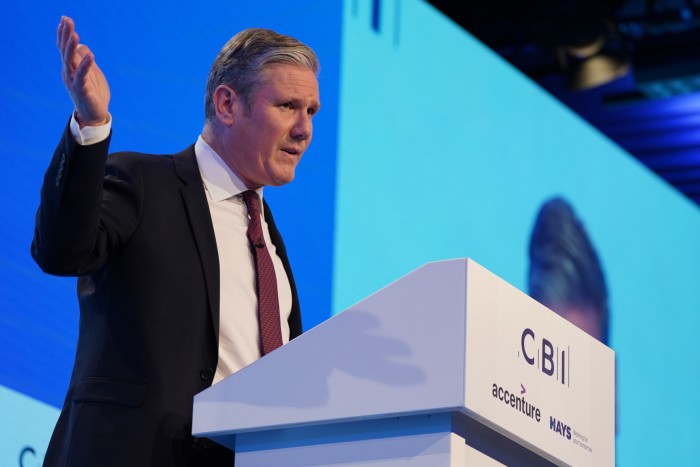Almost exactly a year after Boris Johnson delivered a rambling speech in which Peppa Pig made an unexpected appearance, business leaders at this week’s CBI annual conference were grateful for signs that normality was returning to British politics even if the new prime minister had offered them little in the way of comfort.
For many attendees, this week’s event was overshadowed by what they saw as “dog whistle” comments by both Rishi Sunak and Labour leader Sir Keir Starmer, promising to be tough on immigration following pleas from business for help with visas to address worker shortages.
While many praised the new government’s efforts to tackle inflation and restore stability following the disastrous “mini” Budget by former chancellor Kwasi Kwarteng, the posturing on immigration highlighted wider concerns about a lack of tangible pro-growth policies.
In the wake of last week’s Autumn Statement, which saw chancellor Jeremy Hunt hike taxes and cut spending, CBI director-general Tony Danker had opened the conference on Monday calling for the government to outline a strategy to boost business confidence. This included measures to soften the impact of Brexit, such as fixed-term visas for foreign workers.
Andy Briggs, chief executive at insurance group Phoenix, said that “getting inflation under control and interest rates in sensible territory” was important. But he wanted more done by the government to drive economic growth. “It’s a good early start. We’re starting to see the regulatory change we need. That’s great. But there’s other changes needed to kind of bring about the flow of investment.”
Joni Rautavuori, chief executive of Tharsus, a robotics manufacturer based in Blyth, a key former Labour or so-called “red wall” seat won by the Conservatives in the 2019 election, said the government needed a more consistent approach “that isn’t there . . . the overarching theme is missing”, adding that manufacturers needed “the conditions to remain competitive” globally.
He added: “Hunt’s Autumn Statement had lots of good points but it was all: ‘We will do this later’. As a company, we are saying: ‘What do we do now then?’”
Vonjy Rajakoba, managing director at manufacturer Bosch UK, said his company was holding off “making substantial investment decisions . . . for the time being”.
“We’re seeing uncertainties, especially on the consumer side where we see a stagnation, a worsening of disposable income [and also] an increase in costs for manufacturing.”
He said that there were growth sectors in the UK — pointing to the development of hydrogen technologies — but said that planning for next year was “extremely difficult” as conditions had “changed so radically after the ‘mini’ Budget”.
Peter Hogg, partner at Arcadis, a design and consultancy firm, said he was having to work harder to persuade the company’s Dutch investors that the UK remained a “good bet” for growth.
“As the British division of a business headquartered in the Netherlands, we’ve had to work very hard with our Dutch investors to persuade them that they should still continue to focus on UK business.”


But he added: “We are cautiously optimistic . . . The UK is still investable. Our board is still committed to the UK market. But they have been asking more questions.”
Having listened to Sunak extol the government’s ambitions for R&D intensive industries, some bosses observed wryly that the most notable step by his government so far in that area had been to slash the popular R&D tax scheme for small businesses.
Hikes in business taxes announced last week by the chancellor also worried other executives. David Bunch, chair of Shell’s UK operations, said that it would “evaluate” its £25bn of investments in UK projects on a case-by-case basis owing to a new windfall tax.
Executives expressed disappointment at both Sunak and Starmer over the stance they had both taken on immigration, with some complaining that both leaders had used a forum traditionally meant for engaging with British businesses to conduct party-political messaging.
Anna Orr, a manager at Pawprint, a software platform that helps businesses with sustainability goals, described the focus on immigration as “politics” designed more for certain groups of voters than businesses.
“There are far more pressing issues to address. We are already seeing other consequences of Brexit. We would have liked to see Sunak at least mention net zero or sustainability.”


One senior Labour aide conceded that Starmer’s comments in his speech to the CBI on Tuesday about ending Britain’s reliance on immigration were aimed at reassuring voters in Brexit-backing “red wall” seats.
“It’s very important for us to improve Britain’s productivity and the easiest way to do that would be to join the EU and increase immigration — which business would love — but there’s no way politically we can do that,” they said.
When asked by the FT about what levels of immigration he had in mind, Starmer said he would rather not talk about “arbitrary numbers” and would prefer to focus on his party’s plan to get British companies investing more in local skills.
“If we get this right then immigration will go down in some of those areas that are overly reliant on immigration, but equally we’re not going to hold businesses back if there are innovation technologies where we do need talent from abroad.”


Although Starmer’s speech on Tuesday was generally better received by delegates than Sunak’s 24 hours earlier, they would have preferred the Labour leader to have recognised the urgent need to address short-term labour shortages.
“I totally respect Keir’s views on the need to build skills but that’s a long-term solution”, said Darryn Gibson, chief executive of Sciensus, which employs 1,600 people in the UK in pharmaceutical services, adding: “There is still a short-term need to address labour shortages — even at low-end skill levels the market pressures are enormous.”
Rajakoba said on skills shortages: “We need to build up new skills — and that’s a collaboration with universities — but to ease the immediate requirements, we need a more favourable immigration policy.”
Hogg said there needed to be more flexibility on visas and immigration for skilled jobs. “When we heard so much ambition in Sir Keir’s speech, it was a missed opportunity that he couldn’t be ambitious in that area as well.”
Credit: Source link














